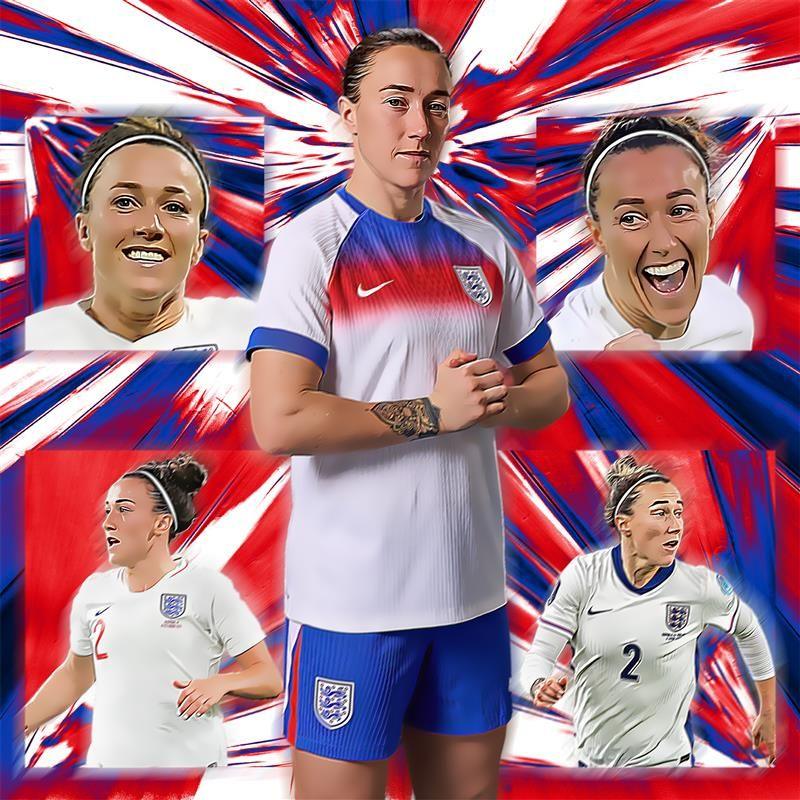England defender Lucy Bronze is no stranger to winning. It's part of her DNA.
She has embarked on a hugely successful career, becoming England's most decorated female footballer, and the 33-year-old is about to begin her seventh major tournament.
"I play every game like it could be my last. When you put on that England shirt, you don't want to leave anything on the pitch," said Bronze.
With 134 caps to her name and a 12-year international career, Bronze hopes to lead England to victory once again at Euro 2025. This is her story.
Born to a Portuguese father and an English mother, Bronze grew up in north-east England, living on Holy Island – a tidal island in Northumberland also known as Lindisfarne – with her older brother and younger sister.
She now speaks multiple languages, including Portuguese, and was close to being recruited by the Portugal national team at the age of 16.
Bronze's football journey began at Alnwick Town and it was here that she became close friends with future England midfielder Lucy Staniforth – her classmate at the time.
"I remember seeing this girl with a red bob hairstyle and I thought she looked funky," Staniforth told BBC Sport.
"I was trying to find a local girls team in Alnwick. I was introduced to her mum. The strange thing was our gardens backed on to each other.
"They were like a second family to me. I spent a lot of my childhood around Lucy's house, causing havoc."
Opportunities to play girls' football then were hard to come by.
But living up to her full name of 'Lucia Roberta Tough Bronze', that did not stop her, or her mum Diane.
"When Lucy was 11, I knew nothing at all about football until they said she couldn't play because she's a girl," Diane Bronze told BBC Radio 4's Woman's Hour in August 2023.
"I said 'don't tell me my daughter can't do something because she is a girl' and that was the change. It never crossed my mind that it was an issue.
"I had to do a lot of research to find somewhere she could go to play with girls."
Bronze eventually joined Blyth Town and then Sunderland, with Staniforth following in her footsteps.
The two shared car journeys from school to Alnwick Town, with Diane often the driver, and years later Bronze would be a bridesmaid at Staniforth's wedding.
"Those car journeys were fun. We would have weird conversations," said Staniforth.
"In that sense, I think me and Lucy were meant to meet because we were two misfits that found friendship in each other. Diane just encouraged it.
"We've known each other for 20 years now. I would describe the relationship as an ever-lasting one. She's the big sister that I didn't ask for – but I'm so glad to have.
"We both felt we could be ourselves and not be judged. We said what was on our minds, did the weirdest things and that is the part of Lucy that I love.
"She is probably not too dissimilar from the person I met all those years ago. Football was not the making of Lucy, but it definitely helped make her the person she is."
Bronze's athleticism had been clear for a while.
She played hockey and tennis at school, and was a keen athlete, competing in the 800m, cross-country and pentathlon.
Staniforth knew challenging Bronze – who started off as a striker in football – to a running race was a lost cause, but keepy-up battles were a good way to compete.
"We would text each other back and forth saying I did 'x' amount. I'm pretty sure at one point we got up to like 800. That's how serious it was," said Staniforth.
"We would spend hours kicking the ball to each other, doing tricks and learning new skills. We had a really big influence on each other in those early years."
Staniforth believes Bronze stood out from the crowd because she was "willing to do more than anyone in the pursuit of her dreams".
She moved to the United States to join the University of North Carolina aged 17 – a significant step in Bronze's journey to becoming an England international.
Having been awarded a scholarship, Bronze studied sports science and was a freshman on the acclaimed Tar Heels college team.
She would leave the US as the first British player to win the collegiate National Championships and made an impression on former coach Anson Dorrance, who had previously led the US women's national team between 1986 and 1994.
"She was shocked at her own level," Dorrance told BBC Sport.
"I don't think she understood how good she was because I asked 'what are your dreams, Lucy?' She said: 'I want to play for England.'
"I said: 'Well, I think you can play for England.' She said: 'They will never find me. No one will ever come to Sunderland.'"
Dorrance reached out to a contact at Arsenal and within weeks, Bronze was called up to the England Under-17s squad.
The two worked together for several years, and reunited at Wembley in November when Dorrance was invited by the Football Association to watch the 0-0 draw with the USA.
It was in North Carolina that Bronze developed the winning mentality that has become synonymous with her success.
Dorrance was passionate about developing "aggressive, combative women" and designed a programme that encouraged that.
He created a 'competitive cauldron' that pitted players against each other in training matches and head-to-heads.
"When I started coaching women for the first time, I did not condescend to them," said Dorrance.
"I wanted to create an environment where every single practice was a competitive war that was documented with data.
"They were evaluated on a daily basis on how often they won. They were also evaluated on where their team-mates picked them in the draft.
"Every player had a rank on what their team-mates thought of them. In a lot of cultures people want to play with their best friends – not in my culture.
"They wanted to play with the best players. They wanted to win. They didn't want to be on the bottom of the list on the bulletin board the next day."
Bronze thrived in the environment but it also tested her resolve.
She volunteered to go head-to-head in the 1v1s with USA international Tobin Heath – a senior player at the time – but "the night before she couldn't sleep", said Dorrance.
"She was certainly going to lose. That wasn't a question. The fear she had was the margin of defeat," he said.
"Why did I design it this way? Because at the end of practice, I wanted it to be certified with data who the best player was."
Bronze's career sky-rocketed after her time in the US. She had impressed England youth coach Mo Marley and later joined her at Everton.
Moves to Liverpool, Manchester City, Lyon, Barcelona and Chelsea followed, with Bronze winning a total of five Champions League trophies, nine league titles and six domestic cups.
Former Ballon d'Or winner Ada Hegerberg, who played with Bronze at Lyon, describes her as a "hard worker" and someone she has a lot of "respect" for.
"I'm impressed by the level she's playing at today as well," she told BBC Sport. "She's been through a lot in her career, injury-wise, and with different experiences.
"The fact she's been at different clubs and always competed at a high level says a lot about her. She's an impressive player."
On the international stage, Bronze has become a leader.
"During the 2019 World Cup I sat on the bench for the whole time and I watched her a lot," said England's current captain Leah Williamson.
"I watched somebody who, at times, picked the team up and put it on her shoulders. I had never seen anyone get every single ounce out of themselves like she did.
"The devastation when we lost in France and in Australia [in 2023] shows me what it means and it makes me want to be good for her because she deserves it."
Her performance against Norway in the 2019 World Cup, scoring a stunning long-range goal, helped England reach the semi-finals.
Four years earlier, she had done the same, against the same opponent, to announce herself to the world in the last 16 of the 2015 World Cup in Canada.
Staniforth believes that was when people first noticed Bronze, who was later named Fifa Best player in 2020, and Ballon d'Or runner-up in 2019.
Now, her legacy is clear.
She has a bursting trophy cabinet but she is also aware of her platform and has used it to raise awareness on topics such as her autism and ADHD diagnosis.
Bronze is also a board member of the Professional Footballers' Association and on FifPro's player council, often taking younger players under her wing, including England forward Lauren James.
"I'm incredibly proud of her. I'm in awe of what she has done and continues to do, knowing the toll it takes on her body and the mentality that's required," added Staniforth.
"I watch her and think: 'How are you still going? How are you still running?' She is a superstar.
"Everyone wants to be a little bit like Lucy Bronze."
Additional reporting by BBC sports correspondent Katie Gornall.
Head here to get involved


